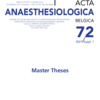Alerting and organisation of the Flemish resuscitation teams
In-hospital cardiac arrest; resuscitation team; cardiac arrest call; 2222
Published online: Apr 21 2022
Abstract
Introduction: There are a number of important factors in in-hospital cardiac arrest (IHCA) that can potentially improve the outcome of patients such as fast initiation of resuscitation and fast defibrillation. To achieve this, a fast alarming of the resuscitation team and a correct treatment according to ALS guidelines are important. A European standardised cardiac arrest call number ‘2222’ has been proposed by different scientific organisations to reduce the call-out time. It is unknown whether this is already applied in Flemish hospitals. In addition, there are no national guidelines for the composition and performance of the in-hospital resuscitation teams. We scored the Flemish hospitals on these important factors in our study.
Methods: A questionnaire was sent to the Flemish hospitals to determine their telephone number for cardiac arrest calls and to question the structure and training of the resuscitation teams.
Results: Nineteen out of 52 Flemish hospitals completed the questionnaire in full. Only 2 hospitals already use the proposed European emergency number 2222. All surveyed hospitals have an in-hospital resuscitation team. The time to arrival of the resuscitation team is estimated at 2 minutes in the fastest hospitals and < 5 minutes in the slowest. On all but 2 of campuses the members of the internal resuscitation team are required to have followed an ALS course, but 89 % of hospitals organize additional training. Standard debriefing of the team after a cardiac arrest call occurs only in 16% of hospitals.
Conclusion: The standardised cardiac arrest call telephone number ‘2222’ has not yet been widely implemented in Flemish hospitals despite a recommendation by ESA, EBA and ERC. It might optimise important contributing factors to survival after in-hospital cardiac arrest. Resuscitation teams in the Flemish hospitals are generally well coordinated and trained. Attention should be payed to simulation training, debriefing and registration of cardiac arrests.
